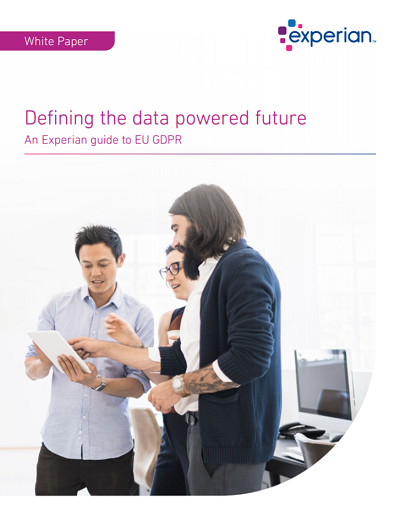
A core theme of the European Union’s General Data Protection Regulation (EU GDPR), which is to keep consumer interests front of mind at all times, mirrors sound fundamental advice for all companies.
Customer centric business practices are especially essential in the data-driven age, driving innovation and opportunity. The transparent, secure and effective use of data has transformative potential for consumers and businesses.
But consumers must feel comfortable and in control of its opportunities, and there is a clear role for our industry to play in addressing their understandable concerns around privacy and security.
In particular, there is a need for more openness about how data is collected and used for the benefit of consumers. In business, we are all aware of the advantages that data-driven technology can bring.
Yet the way data is harnessed for good hasn’t, to date, been central part of the prevailing ‘data narrative’.
At Experian, we process over 1,151 billion records a year, with a global segmentation of more than 2.3 billion consumers in more than 30 countries, and demographic data on over 700 million individuals and 270 million households combined. It’s a responsibility we take very seriously.
We have always aspired to set new benchmarks for best practice in our operating standards and our approach to data stewardship. As a trusted data custodian for millions of consumers, we aim to unlock the power of data to create opportunities for individuals, businesses and society.
 The world is becoming more connected every day, and if businesses are serious about keeping up with the change, a truly holistic approach to managing all this data is required. One which protects our customers and our products from risks, such as an ever-increasing array of cyber threats, while ensuring the customer journey is as relevant and fluid as it needs to be.
The world is becoming more connected every day, and if businesses are serious about keeping up with the change, a truly holistic approach to managing all this data is required. One which protects our customers and our products from risks, such as an ever-increasing array of cyber threats, while ensuring the customer journey is as relevant and fluid as it needs to be.
To help businesses to start thinking about how they can survive and thrive in the new regulatory environment, we’ve created a new whitepaper, ‘Defining the Data Powered Future’. It sets out some key steps that business should consider working through, our three ‘I’s – “Investigate”, “Improve” and “Integrate”.
Businesses need to start to thinking about their implementation requirements now, if they haven’t already. And we hope this paper will offer some food for thought.
It’s not good enough to feel ‘fairly confident’ that the data held is being used in the interests of the customer. It’s a requirement that new levels of scrutiny are applied here, and the customer’s perspective is the be-all and end-all guide to whether you are getting it right.
With the advent of GDPR, this type of joined-up thinking will need to become the new normal, as the “datafication” of our world continues. I would encourage businesses of all shapes and sizes to take the opportunity that this moment brings.
Now is the time to create a truly consumer-centric approach to data governance and strategy, and to secure your customer’s place at the heart of your data powered future.